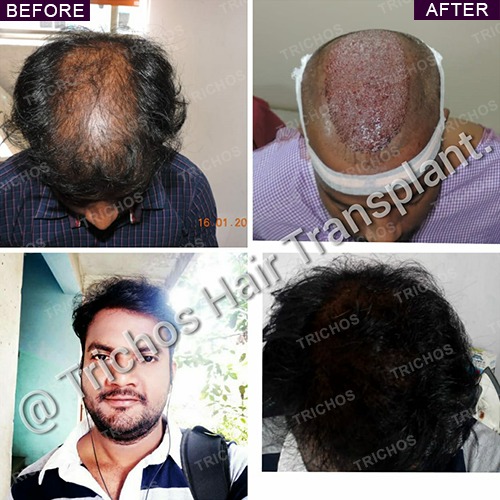Shock Hair Loss & Hair Shedding
Soon after a hair transplant, many experiences the process of hair shedding and shock loss. In both these processes, hair fall is common but there is a difference between the two.
In this educational video, noted Dr John Watts – one of the Best Hair Transplant Surgeons in Hyderabad – simplifies this confusion and tells viewers what they need to understand about the two different processes.
In its growth journey, the hair undergoes three phases – Anagen, Telogen and Catagen phases. “This is a universal phenomenon but even in one individual, the hair cycle may be undergoing different phases for each hair,” explains Dr John Watts in the introductory note.
Hair Growth cycle:
The human hair growth cycle is divided into three phases: They are Anagen, Catagen & Telogen phase.
Anagen Phase:
The growth phase of hair is known as Anagen. In this stage, the hair grows actively and becomes thick. The Anagen phase of hair can stay up to 2-8 years but usually, on average, it stays for 2-3 years for all.
Catagen Phase:
In this phase, the hair growth stops. This is a transition phase that may continue for 2-3 weeks before they go into the next phase.
Telogen Phase:
This is the third phase where the hair growth stops completely and go into the resting phase. The hair remains in this process for 2-3 months before the new growing Anagen phase hair in their proximity starts pushing them up, leading to the hair shedding process.
“It is normal to lose 60-100 hair every day through the process of hair shedding. In their place, new hair starts growing. However, the hair cycle of hair is not uniform as each hair may be going through a different phase of its life,” explains Dr John Watts.
Telogen Phase: Hair Transplant:
Soon after a hair transplant, the hair goes into the Telogen phase. This phase occurs in both the donor area and the implanted area of the scalp. There would be hair shedding but it is not a problem.
“This is because hair growth will soon resume here after the process of hair shedding. One need not worry,” informs Dr John Watts to the viewers, who has performed over 1900+ hair transplants.
Shock Hair Loss: Cause for Worry
While hair shedding is a normal process and no one can do anything about it, hair fall due to a ‘shock loss’ is different. Sometimes the hair loss in this process is permanent, meaning no new hair would grow in their place.
This process can be noticed in both the donor area and the implanted area of the scalps after a hair transplant. In this video, Dr John Watts explains the probable reasons why one may suffer hair fall due to ‘shock loss’.
Five Reasons:
If there is damage to the existing hair in the implanted region during the hair graft transplantation process. The existing growing hair in the region may face a shock loss, leading to hair fall. The damage may occur if donor hair is implanted very densely that may come in contact with existing growing hair, leading to injury.
Use of faulty techniques by the hair expert one approaches is another reason why ‘shock loss’ of hair can occur if enough care is not taken to limit damage to the existing growing hair. The graft implantation technique could also be faulty, leading to shock loss as the graft may not receive adequate nutrients.
The use of improper magnification may also lead to poor outcomes and may also damage the implanted grafts and existing hair, leading to hair fall due to shock loss.
Inexperienced hair transplant surgeons may go for use of big punch size for hair grafts from the donor area, leading to a mismatch of the exact requirement on the transplanted region. The oversized misfit graft punch size – which should normally be in .7 or .8 size - may not snuggly fit in the transplanted region, leading to shock loss.
Overharvesting of graft hair from the donor area may also lead to shock loss as existing hair may get injured if they are implanted very densely. The micro blood vessels may get damaged in the process.
Tips to avoid hair fall from Shock Loss
If adequate care is not taken in the way one finalises a hair transplant surgeon, enough damage may happen. One must always look for a skilled expert for the hair transplant procedure.
Select a skilled hair transplant surgeon
If you have already faced shock hair loss after a hair transplant, speak to your hair transplant expert as to what other alternative methods like NON-SURGICAL treatment or any other technique may be used for hair regrowth.
Trichos is the home of the best hair transplant surgeons in Hyderabad, offering a range of hair loss and transplant solutions. Call us today.
Book an appointment for expert guidance


About
Causes
Alopecia
Restoration
Procedures
Locations
Disclaimer: While hair transplants are generally safe and effective, as with any medical procedure, there can be minimal and temporary side effects based on specific or underlying medical condition of the individual patient. Please consult in person with our qualified medical team at Trichos for a thorough assessment of your specific condition and individualized guidance on the potential risks and benefits associated with our hair restoration treatments.
Learn more about Medical Consent for Surgeries.



